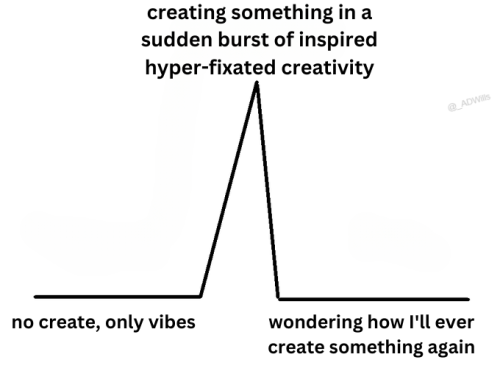151 posts
I Only Just Realized That Is A Hummingbird And Not An Actual Jalapeno

I only just realized that is a hummingbird and not an actual jalapeno
I just accepted it
More Posts from Blckwhtepersona
Sad to say, you're right.... From a writing perspective, this is unacceptable for his character. Throughout all the seasons, he had barely improved as a superhero, despite typically being shown as the important second half of a crime-fighting duo, and when he got worse in Season 4, we're expected to just.... brush it off, even when he was reaching levels of entitled and childish.
I still love Cat Noir, I feel like he was done dirty in the show, but you're right. Based on his representation in the show, Adrien didn't "deserve" to know Ladybug's identity, be Co-Guardian, or have the right to hand out miraculouses, because in all the seasons, he was allowed no room to grow and was largely neglected by the narrative as the wise-cracking comedic best friend and love interest.
Every time I read a post about people complaining how Adrien/Cat Noir ''deserved'' to know Marinette/Ladybug's secret identity, be Co-Guardian or hand out the Miraculous, I want to do this:

...and calmly ask them to show me the exact moment in the whole MLB show where Adrien Agreste has ever proven that he deserves such responsibility.
Because I'll be blown away if there was ever such a moment in the show, and I can assure you that for every reason you find, I can show you ten more reasons why the Cat Miraculous should've been taken away from him in... eh, I'll be generous and say the start of Season 4.
So, this is my understanding. Nuance is key. The difference between "maestro español" and "maestro de español" is that "español" can mean either a Spanish person or the Spanish nationality, and that "de" can be translated to "of". By using "maestro español", I'm describing the teacher as Spanish, thus making "español" a descriptor of the person's origins. But by using "maestro de español", the "de" literally turns it into "teacher of Spanish", implying that "español" is about the language than regarding the person.
Is this correct? I hope so, because I'm not too confident in how I understand this...
Maybe I'm dumb, but I'm having issues using Spanish descriptors. When is the right time to add "de" and when is it not? I would have "restaurante mexicano", but then my head would spin at "maestro de español". I know this is a stupid question, but I don't like how confused I am... is there some rule that denotes when "de" is appropriate to indicate a descriptor, like how you explained "cual" and "que" to me?
With this particular example it's about the nationality and how it comes across
If you said restaurante de México it would be "a restaurant from Mexico" as if the restaurant had originally been in Mexico (which could happen for foreign chains)
And if you said maestro español it would sound like "a Spanish teacher" as in the teacher is from Spain
(el) español is "the Spanish language", but español / española is "Spanish" or "Spaniard", so it becomes a different thing
...This can be especially useful if you don't know the gentilicio "demonym" of what someone is called when they're from a place - like there's a city in Spain called Huelva - someone from there is called onubense ... so un hombre onubense = un hombre de Huelva ; that's an irregular one though, a lot of them are generally straight-forward but still
It also helps if you don't know the nationality like danés/danesa is "Dane/Danish" but then the country is Dinamarca "Denmark"
You may also run into some cities/states/etc where it could be like un restaurante chico "a small restaurant" vs. un restaurante de Chico "a restaurant from (or potentially "in") Chico"
...
But for your example, it's especially important for genders - say you have una maestra francesa "a French teacher" as in "a female teacher who is French" vs. una maestra de francés "a French teacher" as in a "female teacher who teaches French"
Same idea with de inglés "English-related" vs. inglés/inglesa "English" the nationality; or un profesor/una profesora de literatura inglesa "an English literature teacher" for example has nothing to do with their nationality at all
Subjects in school are generally considered nouns, but especially in something where you could confuse someone's nationality with the subject they teach
-
In general if you're talking about adjectives by themselves they don't usually need a de
The adjectival phrases with de are normally de + noun (person, place, or thing)
Sometimes with nationalities it's a bigger difference like above
Other times it can be sort of whichever one you feel like - as in una camisa roja "a red shirt" vs. una camisa de color rojo is "a red-colored shirt" [lit. "a shirt of red color"; where de color (algo) is an adjectival phrase]
-
You will sometimes see de + adjective + noun or de + noun + adjective; same general idea as the other it's just a longer phrase
As an example - de primera is understood as "first-rate", probably de primera categoría ...as de segunda is "second-rate" or sometimes understood as "second class (citizen)" probably again de segunda categoría
But that's different from something like de primera mano "first-hand" where it is specifically "first + hand", and again de segunda mano would be "second-hand" which would mean like a thrift store or "second-hand" clothes etc.
-
Again, not really a set rule aside from a few where it's very important to make a distinction
[Also, side note, de + algo is sometimes referred to as "genitive" in case systems but it's - "of" or "belonging to", where it can also be property/possession in some cases; like la casa de mi amigo "my friend's house" vs a simple su casa "his house" which is much simpler but vague, as it could be "her house" or "their house" too - de + pronoun can be used to indicate clear ownership when something could be vague....... still considered a kind of adjectival phrase, but not the kind of adjective you'd immediately think of]
-
If you have any other specific examples you want me to go over, just message me it can be sort of hard to generalize when some examples come up but I hope that sort of helps
This is so true it hurts
This is what's happening to me right now lol.

THIS.
When a magic system is involved, there's a good deal of flexibility, because the magic system is how you make it. But it's also really easy to make it too OP or to lose sight of how it functions in your world for the sake of just slapping on whatever sounds good—like what happened in MLB. The magic system in MLB has centered too much on the characters, rather than how they impact the storyline.
Besides, given the power the miraculouses apparently have, handing multiple miraculouses out to so many people, sometimes even simultaneously, diminishes the weight of having a miraculous at all. They're powerful pieces of magic, so they need to have that kind of responsibility and risk.
And the "adult" rule? Bleh. Given when the miraculouses were made, the concept of "adult" varies. I'd rather 86-ing it, but if I had to keep it, I would've chosen "fully mature" rather than "being an adult".
Can you think of some better powers for the Miraculous that debuted in season 4?
The whole miracle box needs reworked because they went about it backwards. When developing lore like that, you usually want to start with the magic and then find users for it once the magic system has been worked out to something clear and logical. You should also probably try to base the magic on the culture you're designing your magic around, especially if you're not actually part of the culture in question. Just a thought.
Instead of doing any of that, the Zodic miraculouses appear to have been designed around their eventual holders, which makes for some really nonsense lore like the mess that is the Rooster.
As I discussed at length a little while ago, I would have probably replaced the colored macarons and cheese with the zodiac Miraculous to create more interesting and more limiting powerups. This is very much a personal opinion, but I prefer really strict, limited magic systems because that's when you - and your characters - have to get creative to make things work. If magic is whatever you want, then it can get boring. For example, is anyone actually excited by the idea that Adrien can now cataclysm as many things as he wants in a fight? The scene where he got the power was cute, but really think about what it means. It's no longer going to be a big deal if he hits the wrong target. He can just try again next time, no big deal.
I think the writers really missed the mark on that bit of lore. "Adults" should not have been given unlimited uses. They should have been given more uses, but still needed to recharge.
